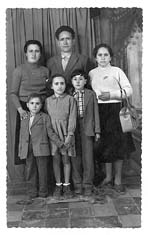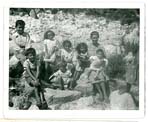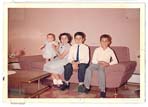Sobey Wall of Honour
Column
107
Row
27
Memories of my immigration to Canada
I was 14 years old on the 15th of March, 1959 when I, along with my parents, 2 younger brothers and a sister said good-bye to our dear grandparents, aunt, uncle and little cousin with whom we lived in southern Italy. With us we had all of our belongings in 2 trunks, 3 suitcases and a few handbags. Our luggage consisted of 2 dresses for myself and 2 for my sister, 2 pairs of shorts and shirts for each of my brothers, all of our homemade blankets, sheets, towels, tablecloths and dishcloths, as well as a litre of our own olive oil and a few pieces of cheese.
It was early morning when the rental car and driver arrived, reserved by my father a few days before. We all climbed in and although we were squeezed together and could not move, we were so thrilled. It was the first time any of us had been in a car! The driver took us to the train station where we boarded the train to Naples. Once in Naples, we climbed aboard the ship Giulio Cesare which was to take us to Halifax in Canada. I did not know it at the time, as I do now, that we would arrive at Pier 21.
For the first 2 days on the ship we were all well, and for us kids everything was beautiful, so much to explore and so much food to eat. Some of the food was strange to me and nothing like I'd ever seen before, for example, olives stuffed with red peppers, tiny pickles, and the tiniest pickled onions. The food that impressed me the most was the sliced bread, and it was so soft! We weren't used to this type of bread and I remember my mother crying and saying that if there was only this type of bread in Canada she wanted to go back to Italy. She would not even try a piece.
As soon as we hit the Atlantic Ocean we were all seasick for the remaining 7 days of our voyage. We only got out of bed to go to the bathroom and to be sick. The waiters were so kind to bring us soup to our cabins. After 9 days we finally arrived in Halifax, all of us a bit thinner!
Following the many people ahead of us, our turn finally arrived to disembark the ship and pass through customs, which took many hours. I remember that my father gave a customs officer some money so that he wouldn't open our luggage.
It was late evening by the time the paperwork was completed and so we rented a room in a hotel near the port. The room was so large that all six of us fit in it. Again we saw many things that we'd never seen before, such as running hot and cold water, electric lighting, and a bathroom with a shower, right in our room.
In the morning we had breakfast in the hotel restaurant. It consisted of eggs, bacon and toast. Who had ever seen such a breakfast!? My mother ate the eggs and bacon but not the bread. Then we went to a department store and my father purchased warm coats and boots for all of us. It was very cold and there was so much snow and all we had on our feet were shoes.
Once we returned to the hotel we packed our bags and took a taxi to the train station. The cab driver was so kind and helped my father put all the luggage aboard the train. Once again we were travelling, so many hours to Mont-Joli in Québec. We were so curious and excited looking out the train windows, seeing so much snow and so many isolated houses. I wondered how people lived surrounded by all that snow. On the train we were served sandwiches filled with lettuce, tomato, ham and cheese, but my mother ate only the filling, and would not try the bread.
Once we arrived in Mont-Joli we descended the train, only to take another taxi to the small airport nearby. Waiting for us was the smallest airplane to take us to our final destination, Sept-Iles. Now we were very afraid, especially my mother. After a couple of hours of flying we finally arrived at our new home town, where we lived for 24 years. We could not believe how much snow there was and the cold was unbearable, but we became used to it just like everyone else there.
My father had come to Canada 6 years earlier and had a very good and secure job with the Iron Ore Company of Canada which was growing rapidly. He had already built our house and had developed many friendships at work. His friends, also immigrants, had already brought their families to Canada and we were fortunate to have them as friends, with whom we are still in touch today. The only other relative we had was a dear uncle, my father's brother, who had immigrated before him.
Slowly my mother learned how to bake bread in an electric oven, though at times we ate undercooked bread and sometimes we ate burnt bread. Even today, at 80 years of age, my mother refuses to eat sliced bread.
A few years ago both my Canadian-born sister and my son had the opportunity to go to Halifax and they both went to visit the now-famous Pier 21. They were there during the summer and they described the beauty of the city, how green it was, and how there were so many colourful flowers everywhere. Instead, when I think of Halifax I remember it all as being black and white!
Today, after 48 years of living in Canada, my husband and I live in our own little semi-isolated house on top of a hill in Eastern Ontario, surrounded by a lot of snow every winter. We are both very happy and proud to be citizens of this vast and beautiful country we call home, our Canada.
Rosa Ritorto


